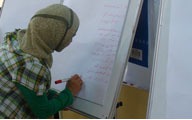
Establishing effective and responsive local government institutions
The USAID-funded Community Action Program (ICAP III) enhanced the ability of Iraqi civil society and local government to meet citizens’ needs. ACDI/VOCA successfully facilitated linkages between citizen groups, NGOs and government leaders in vulnerable areas of Iraq to solve socioeconomic problems through community-driven projects. The program ran from 2008-2012.
Due to decades of centralization of government and a political culture of deference to central authority, Iraqi communities had little experience with advocating for their local needs or mobilizing resources to address these needs. To facilitate the ongoing democratization of Iraq, ACDI/VOCA empowered local communities and government offices to identify and advocate for their own needs and seek and secure appropriate resources to fulfill such needs.
Active in four provinces of northern Iraq (Diyala, Kirkuk, Ninawa and Salah ad Din) the initiative:
- helped communities better articulate needs and mobilize resources to solve common problems
- assisted local executive and representative government to better meet community needs
- assisted civilian victims of conflict
The program had an impact on millions of Iraqis. The community-driven development methodology proved a valuable tool for social mobilization and grassroots democratization. Active citizen participation ensured that all people, including vulnerable populations—those who are displaced, religious and ethnic minorities, women, youth and the disabled—were represented in the program.
Community Action Groups Respond to Community Needs
Through ICAP III, ACDI/VOCA mobilized 80 community action groups. These groups identified, managed and implemented essential economic, social and infrastructure community projects.
Completed Projects Benefit Community Members
ACDI/VOCA facilitated community mobilization activities in 27 districts and 42 subdistricts and implemented over 500 community projects. These projects increased capacity of ordinary citizens to actively participate in setting community priorities and collaborate with the government. Over 100 electricity or water network projects were completed as were 90 school projects, 52 public spaces projects and 29 health care projects.
Improving women’s participation in public decision making was an important part of ICAP. ACDI/VOCA pushed for more female representation in community action groups to better integrate women’s needs into community development planning.
Additionally, nearly 500 small grants were provided to innocent victims of war through the Marla Ruzicka Iraq War Victims Fund. These helped 2,224 innocent victims of U.S. forces-Iraq military operations establish or expand a business to generate income to help them obtain rehabilitation care.
Overall the project reached 5,823,109 people (some individuals benefited from multiple projects), and generated 15,269 short-term and 1,993 long-term jobs.
The results of USAID/ICAP in the northern region of Iraq show that it is possible to introduce a process of grassroots democracy into a population that has never known it.


